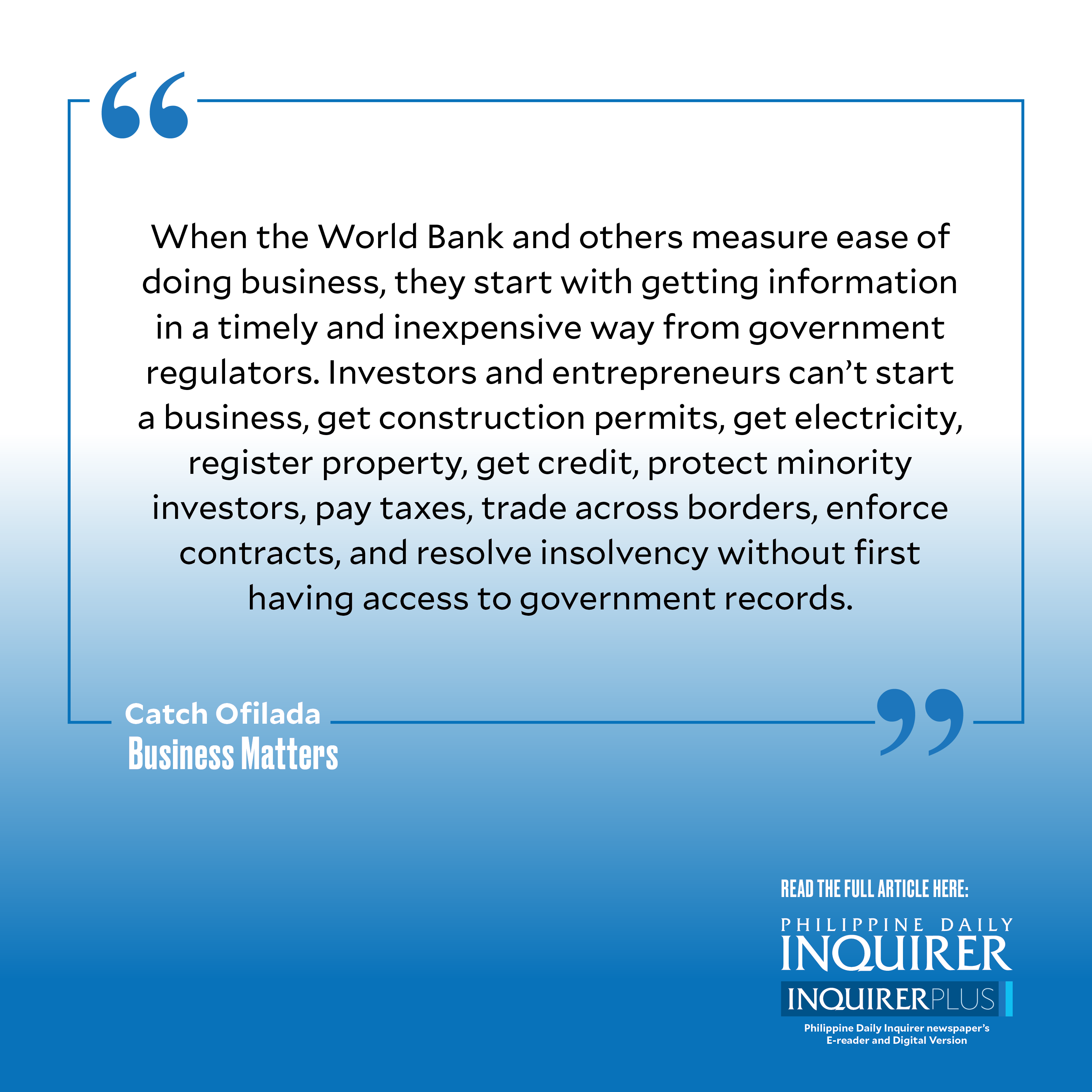Access to information for job creation

For more than a decade, Makati Business Club (MBC) has been the private sector leader in pushing for a Freedom of Information (FOI) law, a crusade begun by others including the late senator Raul Roco in the 1990s. We still don’t have a law. On the other hand, former president Rodrigo Duterte signed an executive order (EO) covering the executive department while 80 local government units (LGUs) have passed FOI ordinances.
We have pursued FOI because we believe it is essential for democracy. It is also important for job-creating investments. In other countries with FOI laws, businesses are its biggest users—law firms and financial service firms make 56 percent of all FOI requests in the United States.
While we continue to support the passage of such a law, the implementation of the EO, and the passing and implementation of LGU ordinances, we have also taken a broader, nonlegislated, view of FOI as part of ease of doing business. How easy is it to get information from government agencies that can enable businesses and investors to make job-creating investments?
We talked to MBC members and their law firms to understand how they access government information. We learned that in the Philippines, information that should be public is hard to get, or at least hard to get in a timely fashion.
As part of this, we welcomed the chance to meet with Securities and Exchange Commission (SEC) officials in December. We shared companies and law firms’ frustration that it is harder to get digital copies of basic documents—such as articles of incorporation, by-laws, general information sheets, and audited financial statements—since the SEC shifted from its iView system to the current SEC Express System in 2019.
A top law firm said that iView was 24/7 while SEC Express—which does produce certified true copies—can take up to four weeks. Singapore’s corporate regulator takes 1 to 2 days, they said.
As a result of slow processes like these at SEC and elsewhere, job-creating investments are hindered. One law firm told us a foreign client asked them to gather information on a Philippine renewable energy company that they were eyeing for investment. It took the law firm more than a year to get the information from the SEC. When the due diligence process was finished, the foreign client’s appetite for investment had cooled and the Philippines lost out on an important investment in an emerging sector.
One multinational requested a certificate of good standing from one agency to comply with the requirements of another. The first agency took 14 days to release the document—seven days past the deadline of the second.
It also adds to business costs, as staff spend more time than should be necessary to get the information. The law firms we spoke to mentioned spending up to 30 hours a month requesting and following up on requests for documents from one government agency. One of the country’s biggest law firms said that it employs about 20 paralegals whose main job is to ask for and follow up on requests for records and information from government offices.
These are not impossible. Agencies like the Philippine Statistics Authority and the Intellectual Property Office of the Philippines release information within three days.
Our hope is that the SEC and others consider faster, more affordable ways to release information, including searchable databases of all basic documents to avoid repeated requests. We hope the Anti-Red Tape Authority (Arta) clarifies that under the FOI EO, simple transactions should be processed within three working days, and complex transactions within seven working days. In line with this, we recommend that Arta review whether government agencies’ charters are updated (they often aren’t). The private sector supports and encourages Arta in vigorously performing its duty to ensure that the deadlines are met, and delays mitigated.
We are supporting the passage of the e-governance bill, which the Marcos administration considers a priority. We encourage the bill’s authors to consider including provisions to strengthen access to information such as instituting standards for records management and mandating online databanks and portals for regulators.
When the World Bank and others measure ease of doing business, they start with getting information in a timely and inexpensive way from government regulators. Investors and entrepreneurs can’t start a business, get construction permits, get electricity, register property, get credit, protect minority investors, pay taxes, trade across borders, enforce contracts, and resolve insolvency without first having access to government records. Improving access to information is a relatively low-hanging fruit that would directly facilitate local and foreign investments to accelerate growth and job creation in the changed global economic landscape ahead of us.
—————–
To learn more about the challenges businesses face in accessing government information and how it impacts job creation, read the “Business Case for FOI” on the MBC website: http://tinyurl.com/MBC-BusinessCaseOfFOI
—————–
Catch Ofilada is director for policy and projects of the MBC, including the “Freedom of Information” project, “Integrity Initiative” project, “Digital Governance” program, and “Economy” program.
—————–
Business Matters is a project of the Makati Business Club (makatibusinessclub@mbc.com.ph).




















